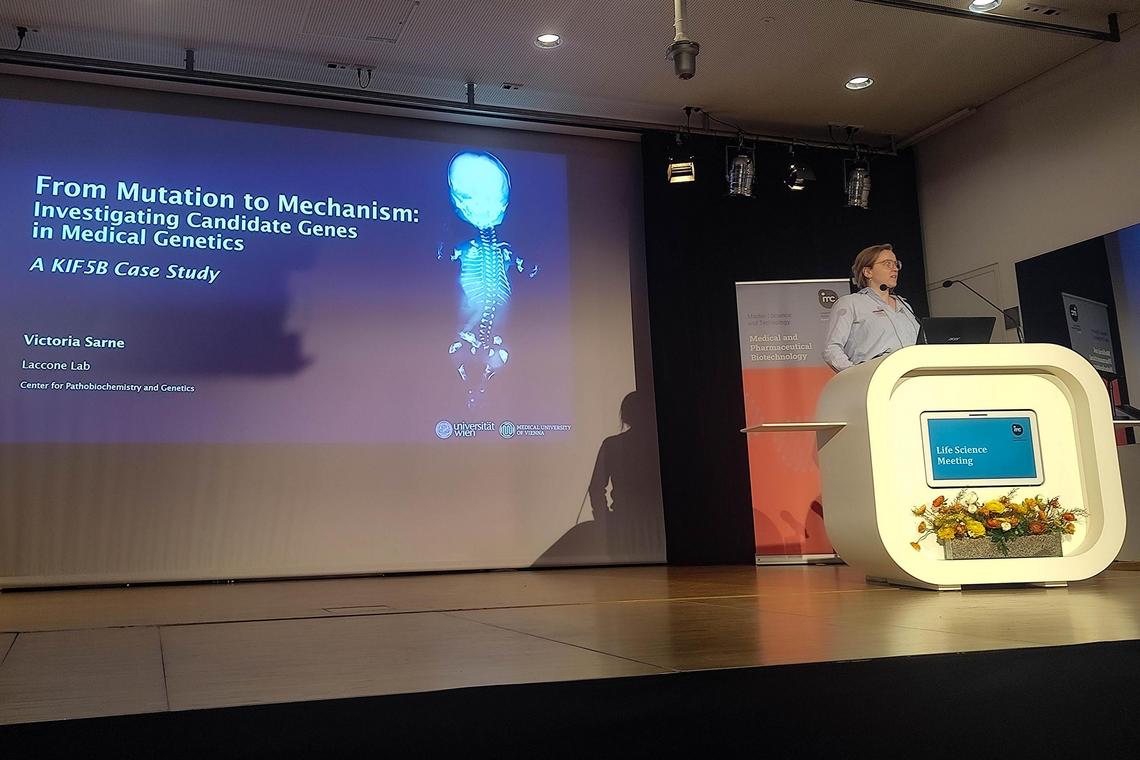Once a student, now a speaker: Victoria Sarne returns to IMC Krems with an impressive scientific journey under her belt. At this year’s Life Science Meeting, the alumna will take to the stage to share a research path defined by curiosity, precision, and genuine passion.
Story
Victoria Sarne – Tracing Clues in the Genome

When Victoria Sarne talks about her research, it’s immediately clear: here stands a young scientist who knows exactly what she’s doing – and why. A graduate of the Master's programme in Medical and Pharmaceutical Biotechnology at IMC Krems, Sarne is now a PhD candidate at the Medical University of Vienna, where she investigates the genetic causes of rare diseases. Her focus: a mutation in the KIF5B gene, linked to striking skeletal abnormalities – a phenomenon scarcely documented to date. Now she returns to her alma mater – as a speaker.
Research with direct clinical relevance
“What fascinates me most about my research is the close interplay between clinical work and basic science,” Sarne explains. The mutations studied by her team at the Centre for Medical Genetics at MedUni Vienna come directly from patients – often with previously unclassified or rare conditions. The group, led by Franco Laccone and junior supervisor Hannes Steinkellner, specialises in the molecular analysis of such barely described genetic changes.
In her current doctoral project, she is investigating a rare mutation in the KIF5B gene, which encodes a motor protein essential for intracellular transport. The patient in whom the mutation was first identified presented with an unusual form of skeletal dysplasia – medically unclassifiable so far. “We now know of three people worldwide with this specific mutation,” says Sarne. “My task is to understand exactly how this change leads to the observed developmental abnormality.”
From cell cultures to animal models: daily life in the lab
What may sound like high-tech theory is, for Sarne, part of her lived experience – and everyday lab work. Her daily routine includes cell culture, biochemical analyses, and experimental procedures using mouse models. At the Ludwig Boltzmann Institute for Osteology, she regularly conducts skeletal analyses in collaboration with Thomas Dechat. But scientific writing and data analysis are also part of the job. “What I particularly love is how incredibly varied the work is,” Sarne says. Alongside her own research, she also supervises Bachelor's and Master's students – passing on her enthusiasm in the process.
From research ambitions to real-world science – a journey shaped by role models
Sarne’s passion for research became apparent early on during her studies at IMC Krems. Internships at the prestigious Karolinska Institute in Stockholm and under the mentorship of Rita Seeböck at IMC Krems proved formative. Seeböck became both a mentor and a role model: “She showed me how important perseverance and passion are in research,” Sarne recalls.
After completing her Master’s degree, she remained at IMC for a time before transitioning to her current research group through existing contacts. She was awarded the Wissenschafft Zukunft science prize for her Master's thesis. A further milestone awaits in summer 2025: Sarne will spend seven weeks at the prestigious Marine Biological Laboratory in Woods Hole, USA – taking part in an advanced research course of the highest calibre.
From lecture hall to keynote stage
Being a speaker at the Life Science Meeting carries special significance for Sarne: “I clearly remember sitting in the audience as a student – often overwhelmed, but inspired.” Her presentation will therefore be especially aimed at younger attendees. At its heart lies a practical insight into how her research group approaches candidate gene analysis – without getting lost in complex datasets.
Curiosity, frustration – and the right environment
“I’m a very curious person – which is worth its weight in gold in research,” Sarne says. What frustrates others often motivates her: “When experiments don’t work, that’s when it gets exciting. I always tell my students: Biology is messy.” A strong social network also helps her navigate the ups and downs – something she consciously maintains. Sports, travel, and meaningful conversations with friends and her partner provide balance. “Mental health is a big topic during a PhD – and a solid support system is the best antidote.”
Childhood dream: lawyer. Reality: scientist.
Originally, Victoria Sarne wanted to become a lawyer – her love of debate was legendary. Today, she debates not in courtrooms, but with data – and occasionally, as she laughingly admits, with her pipette. Her decision to pursue biotechnology, she says, was “one of the best of my life.” And now, standing at the beginning of a promising scientific career, she credits her success to passion, determination – and an unquenchable thirst for knowledge.
About Victoria Sarne
Victoria Sarne is a PhD student at the Centre for Medical Genetics at the Medical University of Vienna. During and after completing her Bachelor’s and Master’s degrees in Medical and Pharmaceutical Biotechnology at IMC Krems, she worked in several research groups both in Austria and abroad, including at the Karolinska Institute. In her doctoral research, she investigates the role of the motor protein KIF5B in skeletal development, combining clinical questions with fundamental molecular biology.
